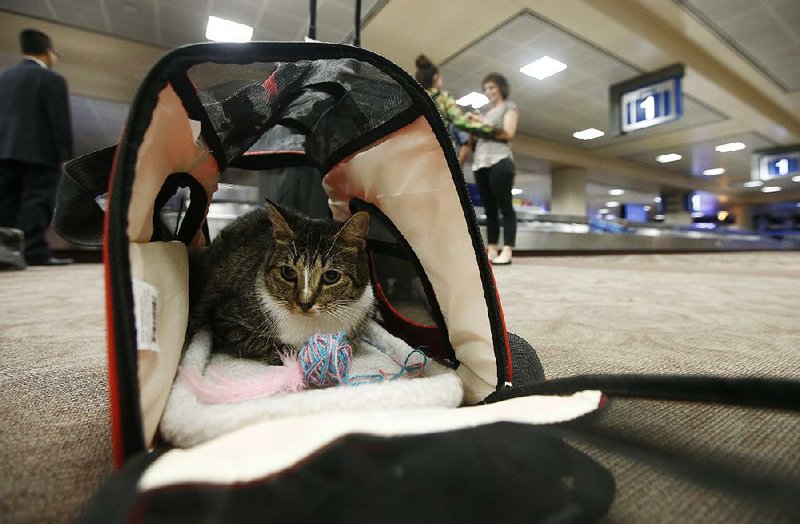The Department of Transportation is proposing an overhaul to the regulations around service animals on flights in the United States, banning all animals except dogs and no longer forcing airlines to let animals accompany passengers who say they need them just for emotional support, officials said Wednesday.
The proposed new rules will be open to the public for comments for 60 days, and then the department will analyze the results before it makes a final decision, it announced Wednesday.
In a statement, the department said it "recognizes the integral role" service animals provide for people with disabilities but added that the changes could help reduce the likelihood that passengers would be able to "falsely claim their pets are service animals."
Under the proposal, passengers with physical or psychological disabilities who want to take a dog into the cabin as a service animal must fill out a federal form attesting that it has been trained to perform tasks that address the disability, officials said.
An animal cannot just be taken aboard to make a passenger "feel better," an official said.
Transportation Department officials said they limited the definition of service animal to dogs because the majority of service animals are canines. However, they said they are open to those who think the definition should be expanded to include other types of animals trained for service.
If approved, the new rules would narrow the department's formal guidance from 2019 that made clear that three types of service animals should be prioritized for travel: cats, dogs and miniature horses. At the time, questions were raised about how the animals could relieve themselves and their ability to fit in confined spaces.
In further limiting the options to dogs, the department said its proposed definition aligns with one used by the Department of Justice and the Americans with Disabilities Act.
Passengers who want to travel with animals can still do so under a carrier's existing rules for having pets onboard. Under the proposal, it would be up to an airline to decide whether to allow an animal to fly for a passenger's emotional support, the department said.
Individual airlines, including Delta and Alaska Airlines, have tightened their rules for transporting service and support animals, and at least 22 states already have laws addressing the issue.
People have tried to take a wide variety of animals on airplanes, including birds, rabbits, monkeys, cats and miniature horses, saying the animals help them with their anxiety or execute needed jobs if they have physical or mental challenges.
The proposals also would require passengers to check in early and have their animals be leashed, be well-behaved, and fit in the owner's foot space. The rules also would limit the number of service animals for each passenger to two. Fines and a possible jail term would be the consequence of lying on the federal form needed to attest to the animal's training.
Douglas Kidd, executive director at the National Association of Airline Passengers, a nonprofit organization that does advocacy work, said airplanes are already cramped. He added that airlines should accommodate animals in cabins by creating more space for passengers and improve air filtration to reduce the possible effect of allergens.
"Saying they are just going to restrict it is not going to do it," Kidd said of the department's proposals. "As airplanes get more and more full, there is hardly room for the people onboard the plane, much less an animal, especially when they have reduced the legroom."
The Association of Flight Attendants, the trade union that represents nearly 50,000 flight attendants at 20 airlines, welcomed the proposals, saying that passengers claiming pets as emotional support animals have "threatened the safety and health of passengers and crews in recent years while this practice skyrocketed."
Flight attendants have been hurt and safety has been compromised by untrained animals loose in cabins, it said.
"Untrained pets should never roam free in the aircraft cabin," the association said. "The days of Noah's Ark in the air are hopefully coming to an end."
Mona Ramouni, 39, who is blind, has relied heavily on her miniature horse Cali, who stands 29 inches at the shoulders, for 11 years to help her with tasks such as crossing the street and finding buttons for elevators.
Ramouni, who lives near Lansing, Mich., said that there were solutions for some of the questions posed by the airlines. Before a 2013 flight, for instance, Ramouni said she tied a plastic bag sprinkled with baking soda on Cali like a diaper for when the horse needed to relieve itself. On the flight, she said, Cali stood easily in the legroom area in front of Ramouni's bulkhead seat.
"When you have a ruling saying horses are no longer allowed, it makes it more difficult," Ramouni said. "I won't be able to say the sky is the limit."
Information for this article was contributed by Lori Aratani of The Washington Post.
Business on 01/23/2020
